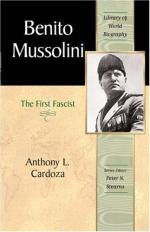|
This section contains 9,717 words (approx. 33 pages at 300 words per page) |

|
SOURCE: “Reading Pound's Politics: Ulysses as Fascist Hero,” in Paideuma: A Journal Devoted to Ezra Pound Scholarship, Vol. 17, Nos. 2 & 3, Fall & Winter, 1988, pp. 145-68.
In the following essay, Sicari examines Ezra Pound's Cantos written before the fall of Mussolini and Italian fascism to find evidence of Pound's conception of the prototypical fascist hero.
To understand Ezra Pound's admiration for Italian Fascism in general and Mussolini in particular, we can examine the poet's conception of heroic action in those of The Cantos written before the fall of the Fascist State.1 In 1938 Pound described “the Malatesta cantos” as “openly volitionist, establishing, I think clearly, the effect of the factive personality” (Guide to Kulchur 194). Sigismundo Malatesta is a hero for this poet because he manages to create something beautiful and good despite the obstacles inherent in a corrupt culture: “All that a single man could, Malatesta manages against the current of power...
|
This section contains 9,717 words (approx. 33 pages at 300 words per page) |

|


